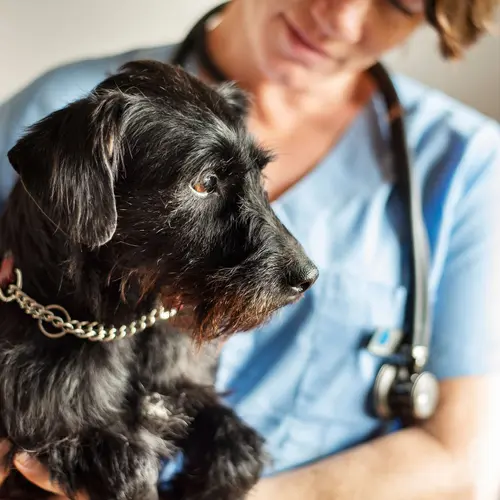Dogs lick for many reasons. Occasional licking can seem affectionate or help you bond with your dog. But when your dog licks your face constantly, it isn't as cute. If the licking is constant, you might become frustrated with your dog. Your dog might not realize your frustration: licking might be how your dog tells you they love you. The act releases endorphins and calms your dog.
Licking is an instinctive behavior for a dog. When they were puppies their mother groomed them by licking and it provided them comfort. Puppies will also lick each other and their mom.
They’re exploring. Dogs use their tongue to understand the world through scent and taste. Licking people and objects is their way of touching things like we do.
They’re grooming themselves. Dogs’ tongues contain some antibacterial properties that clean their fur better. They lick to clean their paws and after they potty. Their tongues are not antiseptic though, which is a common misconception. There are good and bad bacteria on their tongues.
They want your attention. Licking can be your dog’s way of telling you they want to play or get loved. Petting your dog and smiling when they lick you reinforces their behavior. Puppies often lick to get other dog’s attention too. Young dogs licking is usually paired with a lot of excitement.
They’re showing you affection. When dogs lick, they get a rush of good feelings. As puppies, dogs will lick their mother’s mouth and be licked by the mother. They can retain this comfort as they get older. It can also be a submissive action, showing you respect by licking you.
You taste good to them. Scented lotions and body washes on your skin may appeal to them. They could like the taste of salty skin after a workout. Pay attention to when your dog licks you. There may be something on you they want to taste. Your dog may just like the taste of your natural skin. Dogs use taste to explore and know their surroundings.
Your dog may have a medical condition. They may lick spots that hurt or are infected. Repeatedly licking areas is a sign of pain or discomfort. Nausea can also cause your dog to lick their lips a lot. An older dog licking a lot can be a sign of developing dementia. They may lick when nervous, stressed, or scared. They may obsessively lick you or objects near them for comfort. Separation anxiety may be the issue.
Your dog may have Obsessive-Compulsive Disorder (OCD). Dogs can develop compulsive licking. OCD stems from extreme stress and anxiety. With OCD, your dog will lick constantly and can even develop sores on their tongue. You will need to consult a veterinarian.
Tips to Train Your Dog to Stop Licking You
When your dog starts licking excessively, you should check with your veterinarian about underlying medical problems. Once those have been ruled out your veterinarian will determine if they need to address a behavioral issue. There are ways to stop your dog from licking you.
Ignore them when they lick. Your dog may use licking as a way to get your attention. When they lick you, stand up and leave the room. This will show them that licking you doesn’t give them what they want.
Reward good behavior. Give your dog praise and attention when they are well behaved. A good time to reward your dog is when they’re laying calmly beside you. Positive reinforcement is the best method of training. Using deterrents can worsen the underlying cause of your dog's licking.
Redirect their attention with a puzzle or trick training. When your dog starts to lick, distract them with an activity that isn’t related to licking. You can let them sniff out treats in an interactive puzzle. You can also train them to do tricks like “rollover” or “sit pretty.” Training distractions will take their mind off why they want to lick. With consistency, they’ll understand you don’t want them to lick.
Be consistent with boundaries. Your dog can get confused if you let them lick you sometimes and not other times. Set boundaries for you and your dog. It can be hard to not let them lick you if you think they’re being loving. Remember that you can train them in other ways to show affection, like hugs or speaking on cue.
If you can’t curb your dog's urge to lick, you can consult with your veterinarian or an animal behavioral specialist.

